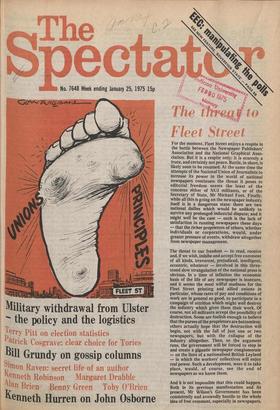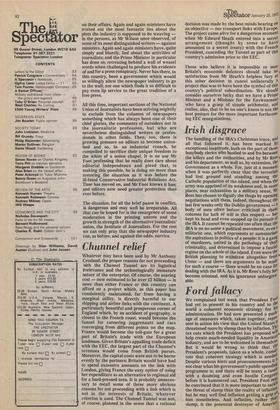The t to Fleet Street
For the moment, Fleet Street enjoys a respite in the battle between the Newspaper Publishers' Association and the National Graphical Association. But it is a respite only: it is scarcely a truce, and certainly not peace. Battle, in short, is likely soon to be resumed. At the same time the attempts of the National Union of Journalists to increase its power in the world of national newspapers continues: the threat it poses to editorial freedom seems the least of the concerns either of NUJ militants, or of the Secretary of State, Mr Michael Foot. Finally, while all this is going on the newspaper industry itself is in a dangerous state: there are two national dailies which would be unlikely to survive any prolonged industrial dispute; and it might well be the case — such is the lack of satisfaction in running newspapers these days — that the richer proprietors of others, whether individuals or corporations, would, under greater pressure of events, withdraw altogether from newspaper management.
The threat to our freedom — to read, receive and, if we wish, imbibe and accept free comment of all kinds, irreverent, prejudiced, intelligent, eccentric, whatever — involved in this threatened slow strangulation of the national press is obvious. In a time of inflation the economic basis of the life of any newspaper is insecure, and it seems the most wilful madness for the Fleet Street printing and allied unions in particular, whose rates of pay and conditions of work are in general so good, to participate in a campaign of attrition which might well destroy the industry which gives them their work. Of course, not all militants accept the possibility of destruction. Some are foolish enough to believe that the purses of the proprietors are bottomless; others actually hope that the destruction will begin, not with the fall of just one or two newspapers, but with the collapse of the industry altogether. Then, so the argument runs, the government will be forced to step in and create a gigantic newspaper conglomerate — on the lines of a nationalised British Leyland — in which the workers' collectives will enjoy real power. Such a development, were it to take place, would, of course, see the end of newspapers as we know them.
And it is not impossible that this could happen. Both in its previous manifestation and its present, Mr Wilson's Government has been consistently and avowedly hostile to the whole idea of free comment, especially in newspapers, on their affairs. Again and again ministers have trotted out the most fantastic lies about the plots the industry is supposed to be weaving — in the persons, as Mr Wilson once observed, of some of its most distinguished writers — against ministers. Again and again ministers have, quite simply and bluntly, lied about the activities of journalists; and the Prime Minister in particular has done so, retreating behind a wall of weasel words when challenged to produce his evidence of and for a press conspiracy. Never has there, in this country, been a government which would so willingly allow the newspaper industry to go to the wall; nor one which finds it so difficult to pay even lip service to the great tradition of a free press.
All this time, important sections of the National Union of Journalists have been striving mightily to exclude from the columns of newspapers something which has always been one of their chief glories, the comments of outsiders not in the journalistic profession, but who are nevertheless distinguished writers or professionals in other fields. Then, too, there is growing pressure on editors to become unionised and so, in an industrial crunch, be compelled to sacrifice their unique freedom to the whim of a union chapel. It is no use Mr Foot professing that he really does care about editorial independence and plead that, in making this possible, he is doing no more than restoring the situation as it was before the ill-fated Conservative Industrial Relations Act. Time has moved on, and Mr Foot knows it has; and editors now need greater protection than ever before.
The situation, for all the brief pause in conflict, is dangerous and may well be irreparable. All that can be hoped for is the resurgence of some moderation in the printing unions and the growth in strength of the alternative journalists' union, the Institute of Journalists. For the rest we can only pray that the newspaper industry can, as before, and against the odds, survive.



























